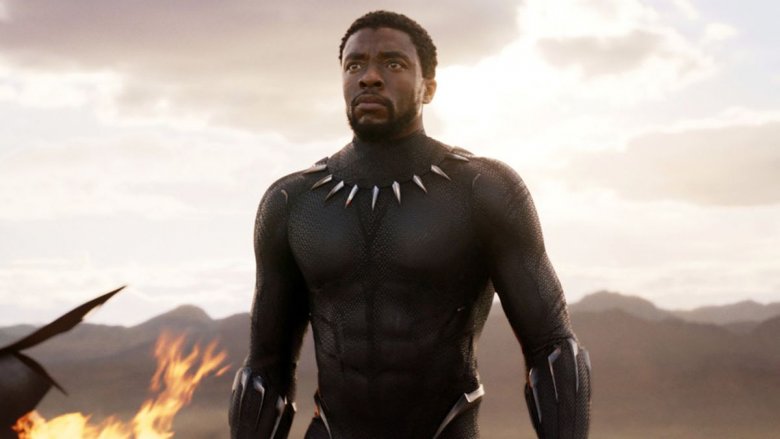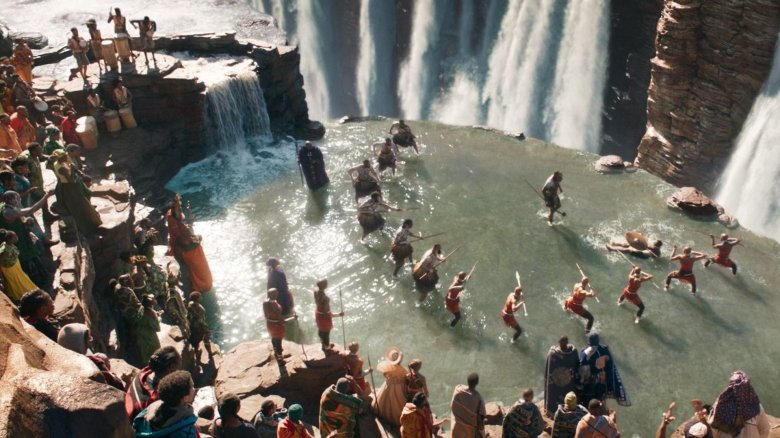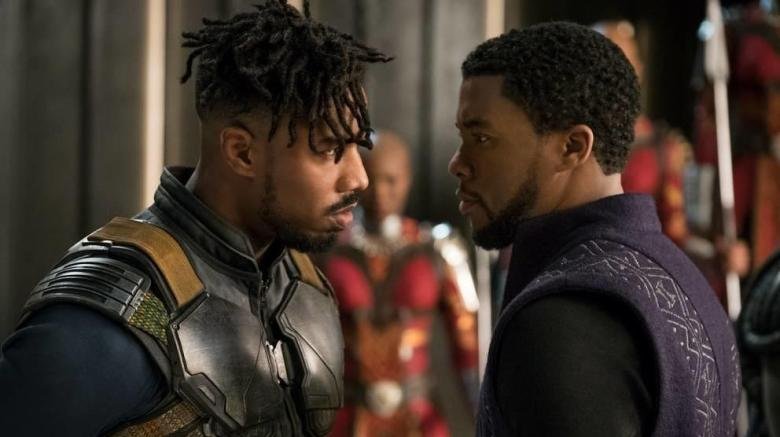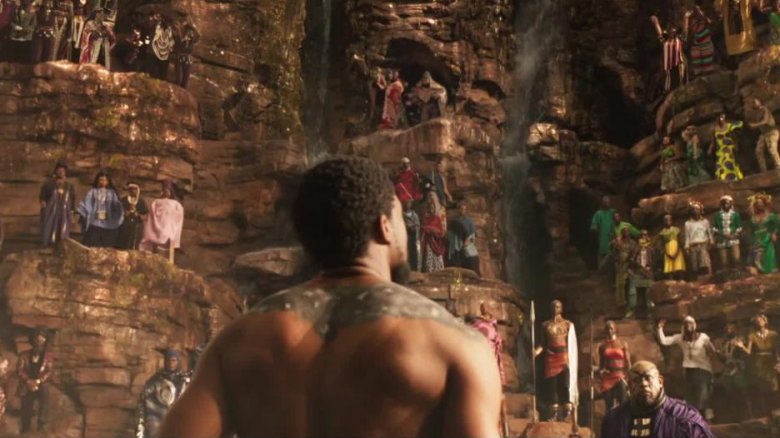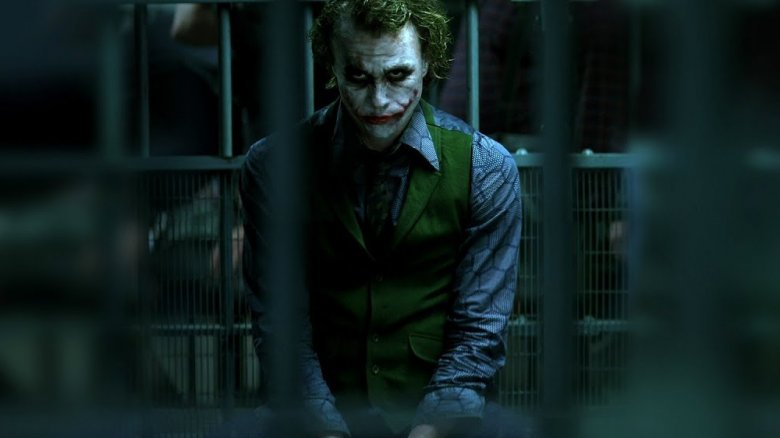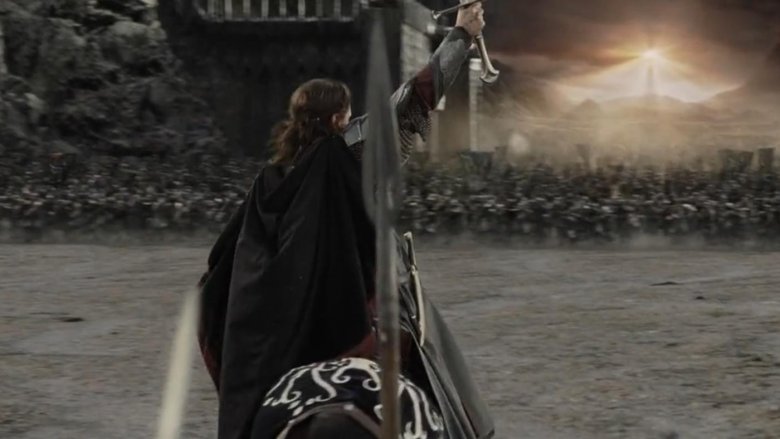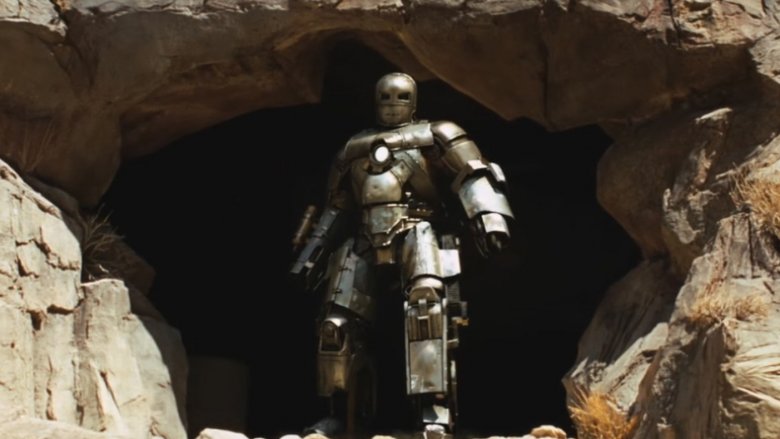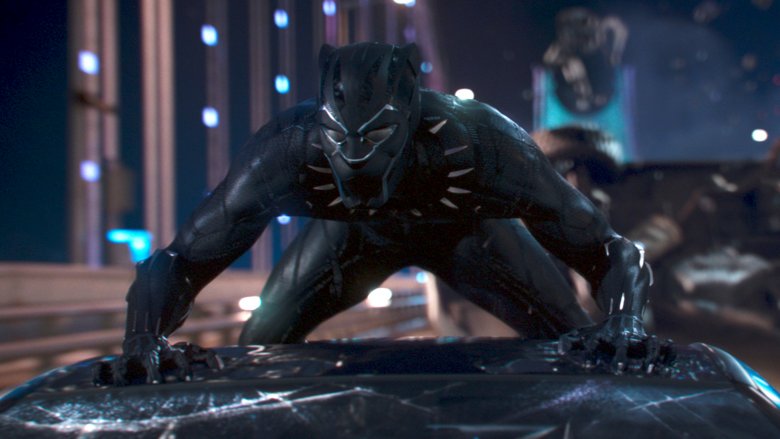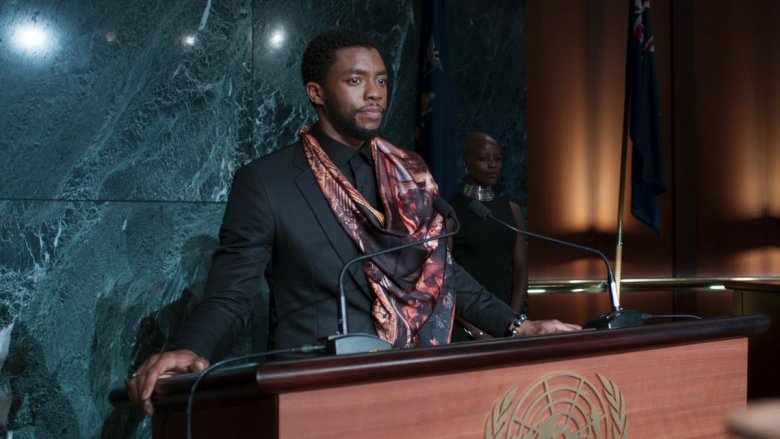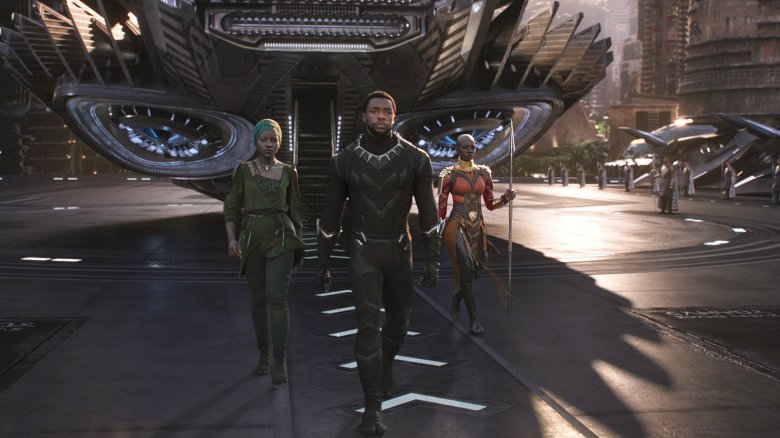How Black Panther Changed The Oscars Forever
The 2019 Oscars made a splash in a variety of different ways. From the lack of a host for the first time in decades to the nominees themselves, the year's biggest awards show felt uniquely tailored to deliver a healthy dose of dramatic entertainment. One of the most highly anticipated parts of the evening? The historic reception afforded of Marvel's Black Panther, which was nominated for an impressive seven categories — including Best Picture.
Millions of avid Marvel fans immediately made plans to tune in and watch this massive box office hit take a shot at locking up some of cinema's most prestigious hardware. Superhero movies have dominated the box office in recent years, but it's rare for them to be honored with nominations in any of the major Academy Awards categories — let alone the biggest one of all. With that in mind, here's a look at how Black Panther was able to claim so many nominations — and how this marks a definitive turning point for the Oscars going forward.
A tremendous tale
We've all become accustomed to Marvel's refusal to settle for superficial storylines in their films. There's no shortage of modern action movies that end up feeling like little more than an excuse to unload a pile of cash on CGI and special effects. The MCU, on the other hand, has figured out how to combine large-scale effects with meaningful plots, deep drama, and complex characters. Nowhere is this more apparent than in Black Panther.
Black Panther's onscreen arc started in Captain America: Civil War, which led to the solo film beginning with T'Challa already having taken up the mantel of the Black Panther. Black Panther was still essentially an origin story, marking the true beginning of the King of Wakanda's story and tracing his evolution as a man who'd just had the weighty responsibility of leadership thrust onto his shoulders. As the story unfolded it didn't skimp on the drama, either, continuing to evolve T'Challa's persona as he struggled with his past, revelations regarding his father, and the repercussions of long-held family secrets. From personal storylines to the introduction of Wakanda as a major location within the MCU, the film's story was masterfully told. Not be greedy, but it's a bit surprising that it didn't receive nominations for Best Screenplay and Best Director too.
A classic cast
Even the best scripts can often feel pointless if they aren't brought to life by quality acting, and Black Panther knocked this one out of the park in spades. Front and center, of course, we have the lovable yet tough Chadwick Boseman, who was able to depict T'Challa as a character with a fierceness of resolve that is a hallmark characteristic of any true hero. But along with that he also brought a depth of feeling, understanding, and complexity that helped elevate the entire movie.
Of course, Boseman's supporting cast was also filled with talented actors — modern cinema staples like Andy Serkis, who played returning villain Ulysses Klaue, as well as up and coming stars like Letitia Wright, who delivered a memorable performance as T'Challa's sister Shuri. And then there's Michael B. Jordan, whose Killmonger isn't just impressive, he's heart-wrenching. In just over two hours Jordan managed to create a personality that rivals the multi-movie character arc of Loki and the dramatic complexity of Thanos. Few would argue that the movie's long list of quality actors was another crucial factor that launched the film into the limelight.
A new perspective
While the MCU started with a hefty dose of adventure with Iron Man's time in Afghanistan, Steve Rogers' time in and around Germany, and Thor's exploits in and around Asgard, most of the franchise's storylines so far have been focused on the good 'ol U.S. of A. Not so with Black Panther. While the movie started with a brief scene in the U.S., it quickly left the amber waves of grain for the continent of Africa, where it maintained its focus for the bulk of the rest of the movie.
The shift in the geographic — and naturally the cultural — focus of the film was expertly done, as the movie retained a Marvel nuance while completely restructuring the civilization and society that the MCU had typically depicted thus far. Within this new context, the film was able to focus on the intense struggle for identity that many African nations face, particularly by contrasting it against the fictional Wakanda, which escaped colonization. It also highlighted, largely through Killmonger's American heritage on his his mother's side, the effects left by the African diaspora over the centuries. The change in perspective marked a welcome expansion of the MCU's already impressive scope.
All bases covered
While acting, directing, and storytelling are all aspects of the film weren't specifically honored by the Academy Awards, a quick glance at the various nominations continues to reveal just how thoroughly the movie left its impact. Two of the nominations came for Sound Editing and Sound Mixing, and it racked up two more for Original Score and Original Song. The quartet speaks for itself. The audible experience of Black Panther, from the sound effects to the music, was superbly executed.
Two more nominations were landed in the categories of Production Design and Costume Design, both of which speak to the film's impressive array of scenery and clothing, all of which effortlessly melded African tradition with the colorful extravaganza that is the MCU. All of these recognitions are neatly wrapped up with the Best Picture nomination which puts a bow on one of the most accomplished chapters in the MCU. While arguments can be made for previous Marvel films that might have been the first to receive the honor of a Best Picture nomination, there's no question that Black Panther didn't deserve the nod on its own merits.
What about Infinity War?
While the inclusion of Black Panther into the 2019 ceremony is no surprise, one burning question that many fans have been asking is why Infinity War was given the cold shoulder. The blockbuster film received a single nomination for Visual Effects, which it certainly earned, but why only one? After all, Marvel's biggest film in the first ten years of its cinematic universe was the movie of the year in many of its own ways. If you break it down a bit, though, Black Panther's awards nominations make more sense.
For one thing, while the heaps of box office receipts accrued by Infinity War were certainly well deserved, at the end of the day it's a crossover movie. The scope of the film is impressive, but the size of the story was likely one of the key factors to its being overlooked. If the Academy members weren't avidly up to date on all of Marvel's intricately interwoven plots, chances are they wouldn't have had quite the same experience as the diehards who were there on opening night. Black Panther, on the other hand, is a superbly executed origin story, focused on a manageable group of characters within a constricted storyline that's fully digestible on its own, likely giving it the edge over its super-sized MCU competition.
The time has come
It's hard to believe that up until Black Panther, the DCEU had more Oscars than the MCU by a whopping score of one to zero, with the lone win coming in the rather pathetic form of Makeup and Costume Design for Suicide Squad. But, while the two comic universes have certainly received the short end of the stick, there have been a handful of awards over the decades given to several superhero classics. Perhaps the nearest and dearest to the heart of all MCU fans was Spider-Man 2, which won an award for its visual effects.
Several years before Suicide Squad, comics fans were also thrilled to see The Dark Knight win two Academy Awards — one for editing and one for best supporting actor, an honor posthumously given to Heath Ledger for his performance as the Joker. However, while the two awards were in many ways a seminal moment in the Academy's history, perhaps the greater impact came from the fact that the film wasn't nominated for best picture. The perceived injustice became a rallying point for comic fans, in many ways helping to pave the way for the achievement that Black Panther finally realized.
The honor of Best Picture
It's this issue over Best Picture nominations that has stuck in the craw of so many comics fans over the years. While there is at least a semi-reasonable track record of nominations for obvious things like makeup, sound editing, and special effects, there has always been a serious lack of attention for comic book adaptations in the Best Picture category. While films like The Dark Knight began to shift the conversation from an "if" to more of a "when," the success of other genres should be taken into account when tracing the path leading to Black Panther's historic success.
For example, it was considered outlandish when the classic animated film Beauty and the Beast was nominated for Best Picture in the early '90s, and yet, since then we've seen films like Up and Toy Story 3 follow in its footsteps. Return of the King later dominated the 76th Academy Awards with a clean sweep, winning all 11 of the Oscars it was nominated for. While comics trailblazers have done their part over time, the "little victories" along the way, like the success of Peter Jackson's monumental trilogy of Tolkien adaptations, have certainly helped reshape the landscape, setting the stage for the Best Picture nomination that finally took superhero movies to the next level of acclaim.
A genre matured
Another factor behind the gradual acceptance of comic book and superhero-based movies comes from a certain level of cinematic maturation that has taken place over the years. It's a phenomenon that comic books have known for a long time now. Since their early days, the MCU's printed forefathers have grown with their audience. As their fanbase of readers aged, it became vividly apparent that both DC and Marvel aged as well, with their storylines and characters growing ever more complex.
In many ways, the MCU has been seeing a similar evolution. After a long incubation period that saw characters like Tony Stark, Thor, and Captain America getting their sea legs, the modern concept of a superhero movie has certainly come a long way over the last decade. As the MCU has found its stride, it's played on a bigger canvas and grasped at loftier ambitions (Guardians of the Galaxy, Infinity War) as well as more complex character arcs (Black Panther, Thor: Ragnarok).
This has naturally pushed the end product to higher levels. While that initial growth culminated with Black Panther's recognition by the Academy, it's only a matter of time before we see even more mature, more accomplished superhero films — and see more of them reach the Oscars podium.
Honorary or legitimate?
One haunting question for MCU fans is whether the Black Panther nomination is a true bellwether or simply an outlier. The pressure on the Academy members to take blockbuster movies under consideration has been enormous since The Dark Knight was passed over for Best Picture. In spite of the outrage, though, it still took a solid decade before they felt a project was worthy of recognition, with quality films like Avengers and Guardians of the Galaxy ignored during the interim.
The question regarding the seriousness behind the nomination loomed even larger when the film was also nominated for best dramatic movie, along with best original score and best song, at the Golden Globes — nominations that passed without a single win. While the Golden Globes don't always follow the same path as the Academy Awards, the omen wasn't favorable.
What makes a Best Picture?
While the system for choosing each Oscar category's nominees and subsequent winner is complicated, it can largely be boiled down to a couple of key points. With the nominees, in particular, qualifying members of the academy are asked to submit their top ten choices for Best Picture. However, once these are tallied up, the resulting list is anything but a simple "top ten" selection. On the contrary, most of the candidates are chosen from the films that received the most first-place votes. In other words, if a nominee makes the list, chances are they received a significant number of votes as a first place choice. Remember that old saying, "It's an honor just to be nominated"? In the case of Best Picture at the Academy Awards, it's truer than you might think — and in the case of Black Panther, it's almost certainly a harbinger for hugely popular genre pictures in years to come.
Looking forward to the future
There are many reasons Black Panther broke through the barrier of acceptance with the world's most prestigious awards ceremony. The prelude of events including encouraging successes like The Return of the King and infuriating failures like The Dark Knight initially paved the way. However, the work of its predecessors hardly diminishes the quality of Black Panther itself, which is fully deserving of the attention it has received. The combination of timing and quality has launched director Ryan Coogler's creation into the spotlight as it vies for recognition that has been denied to so many similar films before.
The most exciting part about 2019's Academy Awards, however, is what it might lead to next. The final acceptance of superhero movies into a more general consideration as awards-worthy entertainment has further opened the doors for serious filmmakers and artists to genuinely invest themselves into their comics-to-screen adaptations — not only in the hopes of garnering the adulation of the fans, but of possibly winning a nice shiny Oscar while they're at it.
